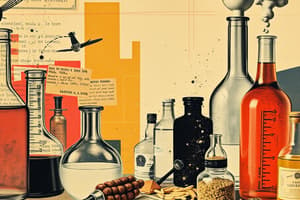Podcast
Questions and Answers
What is chemistry?
What is chemistry?
Study of matter.
What is matter?
What is matter?
Anything that has mass and volume.
What is mass?
What is mass?
Amount of matter in an object.
What is volume?
What is volume?
What is a pure substance?
What is a pure substance?
What is a mixture?
What is a mixture?
What are elements?
What are elements?
What is a compound?
What is a compound?
What is a heterogeneous mixture?
What is a heterogeneous mixture?
What is a homogeneous mixture?
What is a homogeneous mixture?
What are alloys?
What are alloys?
What are properties of substances?
What are properties of substances?
What are physical properties?
What are physical properties?
What are the three states of matter?
What are the three states of matter?
What is melting point?
What is melting point?
What is boiling point?
What is boiling point?
What does malleable mean?
What does malleable mean?
What does ductile mean?
What does ductile mean?
What is solubility?
What is solubility?
What is conductivity?
What is conductivity?
What is density?
What is density?
What is a chemical property?
What is a chemical property?
What is flammability?
What is flammability?
What is corrosion?
What is corrosion?
Study Notes
Chemistry Overview
- Chemistry is the study of matter, which encompasses all physical substances in the universe.
Matter
- Matter has mass and volume, comprising everything that makes up the universe.
- It is categorized into pure substances and mixtures.
Mass and Volume
- Mass refers to the amount of matter in an object.
- Volume indicates the space occupied by an object.
Pure Substance
- Defined as matter with only one type of particle.
- Can be further divided into elements and compounds.
Mixtures
- Formed from two or more pure substances without chemical bonding.
- Mixtures can appear in heterogeneous or homogeneous forms.
Element
- The simplest form of matter that cannot be broken down into simpler substances.
- Composed of only one kind of particle.
Compound
- A pure substance formed from two or more elements combined in specific ratios.
- Elements within compounds cannot be separated by physical means.
Heterogeneous Mixture
- A non-uniform mixture where components can be differentiated by visible clumps.
Homogeneous Mixture
- Consists of substances that are evenly mixed at a microscopic level, making individual components indistinguishable.
Alloys
- Homogeneous mixtures of metals, often exhibiting enhanced strength or hardness compared to the individual metals.
Properties of Matter
- Unique characteristics of pure substances.
- Includes physical and chemical properties to identify materials.
Physical Properties
- Observable or measurable traits such as color, melting point, and conductivity.
- Can be evaluated through senses or calculations.
States of Matter
- Matter typically exists in solid, liquid, and gas states.
- Each state is a physical property useful for identification.
Melting and Boiling Points
- Melting point refers to the temperature where a solid turns into a liquid.
- Boiling point is the temperature where a liquid transitions to gas.
Malleability and Ductility
- Malleability refers to a metal's ability to be shaped into thin sheets.
- Ductility describes the capability of metals to be drawn into wires.
Solubility
- Refers to the extent to which a substance can dissolve in another, often water.
Conductivity
- The ability of a material to conduct electricity or heat.
- Essential for electrical applications, influencing safety and functionality.
Density
- Represents the mass per unit volume of a substance, calculated as Density = mass/volume.
- A consistent property across different quantities of the same substance.
Chemical Properties
- Describe how a substance behaves during chemical reactions, indicating changes into new substances.
Flammability
- The ability of a substance to react rapidly with oxygen, releasing energy.
- Important for safety regulations regarding materials.
Corrosion
- A slower chemical reaction of certain metals with oxygen, leading to the formation of metal oxides, also referred to as oxidation.
Studying That Suits You
Use AI to generate personalized quizzes and flashcards to suit your learning preferences.
Description
This quiz covers the basic concepts of chemistry, particularly focusing on matter, its mass, volume, and the differences between pure substances and mixtures. Explore the distinctions between elements, compounds, and types of mixtures in this comprehensive overview of fundamental chemistry principles.




